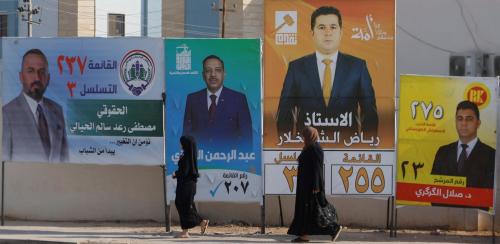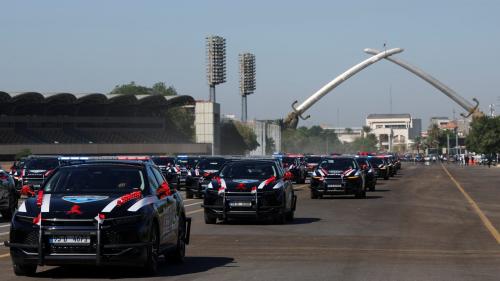The basic situation in Iraq remains as Gen. David Petraeus and Ambassador Ryan Crocker described it to Congress last month — substantial progress on the battlefield, little progress in the halls of the Iraqi parliament. Local leaders have made power-sharing deals in some of Iraq’s provinces, but without a way to break the deadlock at the central level, there won’t be stability.
Rather than continuing to place all our hope in Baghdad, it is time to do what Sen. Joseph Biden, D-Del., and a majority of his fellow senators have been pushing of late: Build on that local progress by advising Iraqis to consider a form of federalism or, as we call it more bluntly, a soft partition of Iraq.
Last Wednesday, the often-divided Senate voted 75-23 to back a resolution sponsored by Biden to decentralize Iraq into regions. Sunday in Baghdad, bitterly divided Shiite and Sunni leaders, in a rare moment of unity, denounced the Biden resolution. Unfortunately, while Iraq’s Arab leaders can agree on what they don’t want, they still can’t agree on what they do want. Efforts to forge compromises on the key issues that divide them have failed.
Instead of clinging to the dwindling hope for a breakthrough, our approach is premised on a core truth: Centralizing power in Baghdad makes a sectarian power struggle almost unavoidable. Shiites, who make up 60% of the country, were denied full access to power throughout Saddam Hussein’s rule (and before). For them, Baghdad has not only been Iraq’s capital, it has also been the source of their systematic oppression. Though free elections have effectively guaranteed Shiites’ dominance in the new Iraq, they still fear a Sunni attempt to reclaim power. This has led to wholesale sectarian division of government into fiefs, leaving Sunnis alienated and Shiite militias empowered.
Experience in postwar Bosnia suggests that these kinds of suspicious attitudes are enduring and deeply destructive. But Bosnians have at least been free of conflict in the 12 years since the Dayton Agreement ended their war. It might be time to help Iraqis find their own Bosnia-style means of accommodation, as their own constitution permits.
Some critics argue that soft partition would make the United States vulnerable to the charge of having deliberately “weakened a strong Arab state.” They overlook the fact that by toppling Saddam, the United States did weaken a militarily strong Arab state. What exacerbates Iraq’s weakness today is the vicious civil war. Ending this conflict is the first step in restoring Iraqi strength. And finding a sustainable political order is the key to ending the sectarian warfare.
Skeptics will cite Sunday’s parliament statement as proof that Iraq’s Arabs don’t want formal separation. But an ABC News/USA TODAY/BBC/ARD poll shows more than half of the Shiite population favors such partitioning, and a clear majority of all Iraqis believe that the country will be divided in some fashion. Even more meaningful than what Iraqis tell pollsters is what they do at the polls. In the two 2005 elections, by increasing numbers, they voted across the board for ethnosectarian parties — the same parties now locked in a bitter power struggle in Baghdad. In any event, regardless of how Iraqis feel, the sad truth is that sectarian division on the ground is happening anyway.
Washington cannot impose soft partition. What it must do, as a start, is to cease its insistence on centralized power. Instead, we can follow promising trends and encourage the development of regional and provincial power structures. Iraqis — not outsiders — will decide on the number of regions, their boundaries and other issues, but there is nothing wrong with the United States, perhaps in conjunction with the United Nations and Iraq’s neighbors, advancing a conversation that has already begun and is fully consistent with Iraq’s constitution.
Soft partition will not solve all of Iraq’s problems, or all of ours. Protecting populations as they relocate under such a plan will require large numbers of U.S. forces — perhaps more than 100,000 until 2009, then closer to 50,000 for a few more years. Feuding in places such as the southern oil-producing city of Basra will be hard to stop, even with this approach. Iran will try to keep sowing mayhem. Building regional security structures will take time. A law to ensure sharing of oil revenue will still be crucially important — and will still have to be overseen by a centralized government.
Even so, these problems pale next to the dangers of allowing the country to again teeter on the brink of full-scale civil war. It is time to match innovation in our military strategy with a new approach to the crucial political question. And it is time for Iraq’s leaders to either make fundamental compromises or acknowledge that moving in the direction of separation could be the only way of keeping their country together.
The Brookings Institution is committed to quality, independence, and impact.
We are supported by a diverse array of funders. In line with our values and policies, each Brookings publication represents the sole views of its author(s).



Commentary
Op-edThe Case for Soft Partition
October 3, 2007